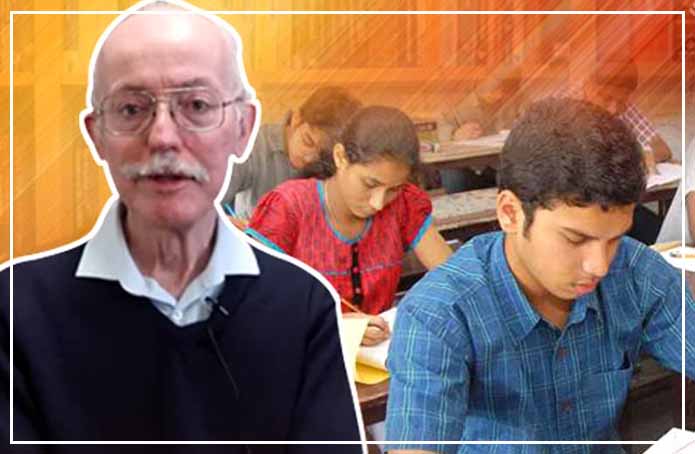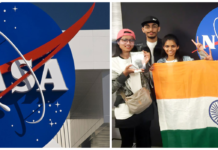Before talking on this aspect, it is necessary for one to know about IIT-JEE. Students have to go through this examination to get admission in various engineering colleges of India. It is the hybrid of two different examinations – JEE Main and the JEE Advanced. In consecutive years, lakhs of Indian students hopeful to become engineers give the test to secure a seat at an Indian Institute of Technology.
Recently a video got viral by an Australian Professor in which he had highlighted the difficulty level of the IIT-JEE entrance exam. He had reacted to the IIT-JEE question paper. He also said that this IIT-JEE is used to admit students into the top engineering colleges of India, including the prestigious Indian Institutes of Technology. The candidates were required to answer questions on mathematics, physics and chemistry.
A YouTuber ‘Tibees‘ on the viral of the Australian Professor video on IIT-JEE, interviewed six Australian professors and asked them to review a JEE question paper.
Dr. James Hutchison, an Australian Professor flipped through the question paper of IIT-JEE and said thank God, I did not appear for this exam otherwise I would have left the exam room crying. He also gave his wishes to the Indian students appearing for this exam “good luck, good luck.”
Professor Barry Hughes, a mathematician, said he had a look at a couple of the math section papers of IIT-JEE and it would have been challenging for him too to get a decent result in an hour. The interview was taken by other professors also pointed out that the questions which were asked of high school in India were not less than the topics taught at the university level in Australia.
The professors also objected on whether or not the JEE exam could be taken as a good way of selecting potential engineering students.
Dr. Shane Huntington said a lot of the questions in IIT-JEE were based on the principle of memorization and recitation, which according to him is an extraordinarily bad education tool.
Mathematician Barry Hughes also pointed out the “ugly question” of unequal access to resources and coaching classes for all the students. As some could afford it and some could not.
He further said that in any educational system if one goes to a good school, well resourced, with the best teachers then one can expect a better outcome. But with this discrimination of examinations, there’s swapping between the student’s ability in the subject and natural intelligence. He also said that the papers are quite lengthy, while others pointed out how a students’ knowledge could be judged in 3 streams of science by a single paper.
Dr. Jasmina Lazendic-Galloway also pointed out that the IIT-JEE paper is simply a formality of judging someone’s knowledge and also added to it that the difficulty level of papers is high.
According to him IIT-JEE exams which are in drill design usually requires students to practice a lot before making that grand attempt because attempting three subjects in an hour is not a joke. But this would not be the determinant of how well the student will do in the next step of education.
Here is the video
Leave about the difficulty level of IIT-JEE but making a paper so tough itself stops the entry. In all 12-14 lakh students appearing for the IIT- JEE Main every year, only around 2.2 lakh students get through for JEE Advanced. In which, only 11,000 students get selected for the best Indian colleges and others are left with an option of drop and to study again for the next year.
However, there could be reasons in India to set papers in this way. Anyways, good luck to those who are going to sit for the exam in the future or have given it in the past.
After going through the entire details, it is my suggestion too, that the wholesome change of the protocol is required. The procedure should be cut short, have to find an easy way for admissions in various colleges and the most important, papers should be made in such a way, which could detect the real knowledge of the students. This would generate good Engineers which can help India to grow in its development. Otherwise each year after the struggled entrance, a large number of IITians are passing out and again struggling for jobs and are nowhere. This truly demotivates the child and starts thinking he is useless.
This exam had gone a series of changes from 2012 to 2019 raising the difficulty level for students. They get over pressurized and stressful. But, the changes brought in 2019 bit relaxing for the students. This exam is now conducted twice in a year and that too, by National Testing Agency (NTA).
The sequences of changes are highlighted below:
- In 2012, the government-run Central Board of Secondary Education(CBSE) that earlier conducted the AIEEE,
- JEE replaced the AIEEE and IIT-JEE.
- The JEE-Main, gave admission to the National Institutes of Technology(NITs), Indian Institutes of Information Technology(IIITs), and some other colleges designated as “centrally funded technical institutes” (CFTIs).
- The JEE-Advanced, then replaced IIT-JEE, in this the students selected in JEE Main are eligible for appearing in JEE Advanced.
- There are some institutes like the Indian Institutes of Science Education and Research (IISERs), Rajiv Gandhi Institute of Petroleum Technology, and the Indian Institute of Science, use the score obtained in JEE Advanced as the basis for admission.
- In September 2013, the IIT Council approved the decision of the Joint Admission Board to continue with the two-phase JEE pattern (“Main” followed by “Advanced”) for IITs in 2014. Joint Seat Allocation Authority (JoSAA) conducted the joint admission process for a total of 23 IITs, ISM, 32 NITs, 18 IIITs and 19 other Government Funded Technical Institutes (GFTIs).
- As per the reports from Ministry of Human Resource Development(MHRD) of Government of India, the government is considering to conduct only one common engineering entrance test based on the lines of NEET for all engineering colleges, including private institutions, across India.
- From 2013 to 2016, the marks obtained in the class XII school board examination used to be accorded a 40% weightage in deciding the JEE Main all India ranks.
- From 2017, CBSE made Aadhar card mandatory for students applying for JEE. Students not having the card were asked to register for it before applying for JEE.
- From 2019, JEE Main will be conducted two times in a year and it will be conducted by National Testing Agency (NTA).
“Development of a Country is only possible with Smart Youth which can be generated only by Smart Education System”






















